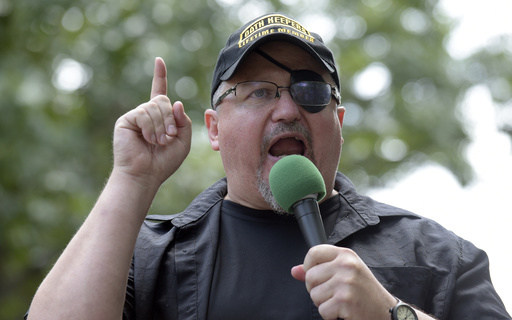WASHINTON — A federal judge overseeing the seditious conspiracy trial involving members of the Oath Keepers raised concerns on Wednesday about the potential pardon for the group’s founder, Stewart Rhodes. The judge characterized it as “frightening” given Rhodes’ orchestration of a violent scheme intended to keep former President Donald Trump in power following his 2020 election defeat.
President-elect Trump has previously affirmed his intention to pardon those who participated in the Capitol riots almost four years ago. Currently, Rhodes is facing an 18-year prison sentence after being found guilty of seditious conspiracy alongside fellow Oath Keepers, marking the most severe charge connected to the January 6, 2021, attack by a mob supporting Trump.
During the sentencing of William Todd Wilson, a former member of the Oath Keepers from North Carolina who admitted to seditious conspiracy, U.S. District Judge Amit Mehta hinted at the alarming possibility of Rhodes receiving a presidential pardon. Judge Mehta noted, “The idea of Stewart Rhodes being exonerated for his actions is disturbing and should alarm anyone concerned about democracy in our nation.”
This isn’t the first instance where a federal judge expressed discontent regarding the likelihood of Trump issuing pardons to numerous Capitol rioters if he regains the presidency. U.S. District Judge Carl Nichols, also a Trump appointee, conveyed his grievances in a hearing last month, stating it would be “beyond frustrating and disappointing” should Trump choose to grant widespread pardons to those involved in the Capitol events.
On the campaign trail, Trump has repeatedly termed the January 6 rioters as “patriots” and “hostages,” promising he would “absolutely” pardon individuals who assaulted law enforcement if they are deemed innocent. Additionally, he has indicated that he might consider forgiving former Proud Boys leader Enrique Tarrio, who received a 22-year sentence for a separate conspiracy aimed at obstructing the peaceful transfer of power to President Joe Biden.
Over 20 judges have ruled on more than 1,500 cases linked to individuals charged in the January 6 incident. Many defendants have requested postponements in their proceedings until after the elections, but judges have predominantly declined these requests, proceeding with guilty pleas and sentencing sessions.
William Todd Wilson, age 48 and hailing from Newton Grove, North Carolina, was among several Oath Keepers cooperating with the Justice Department in its investigation into the far-right group. This prosecution stands out as one of the most significant developments stemming from the January 6 events.
Judge Mehta opted for a one-year home detention and three years of probation for Wilson, as opposed to imprisonment. Prosecutors had called for a year behind bars for Wilson, a veteran of the U.S. Army and a former firefighter.
Mehta commended Wilson for his decision to accept responsibility, especially when many of his associates have not. He remarked, “Establishing the true history came at a considerable cost to you,” referring to the loss of Wilson’s military benefits following his guilty plea in May 2022.
In preparation for their plans, Rhodes and his followers gathered weapons and organized “quick reaction force” teams in a Virginia hotel, ready to transport firearms into Washington, D.C., if necessary. Although the firearms remained at the hotel, the judge found it unsettling to consider that “one directive from a crazed individual” might have activated those weapons during the unrest.
“Simply uttering those words should be shocking to anyone,” the judge remarked.
Wilson did not provide testimony in any of the trials held for the Oath Keepers leaders or associates involved in the January 6 attacks. Prosecutors mentioned that Wilson eroded his credibility due to contradictory statements made to investigators regarding his illegal actions.
“From witnesses, we seek the unembellished truth, offered without an attempt to gain favor with the government,” stated Assistant U.S. Attorney Kathryn Rakoczy.
Expressing sorrow and regret for his actions during the January 6 incident, Wilson said, “I have endured substantial losses since that day. The mental toll this has taken on me has been nearly unbearable.”
On the same day, prosecutors urged a different judge to deny a convicted Capitol rioter’s plea to attend Trump’s inauguration on January 20 while under judicial supervision. Cindy Young, a resident of New Hampshire, had been sentenced to four months in prison along with a year of supervised release.
Prosecutors contended that Young poses a risk to the capital city and to the police officers who defended the Capitol during the January 6 riots. U.S. Magistrate Judge Michael Harvey allowed Young until December 24 to counter the prosecutors’ assertions.


